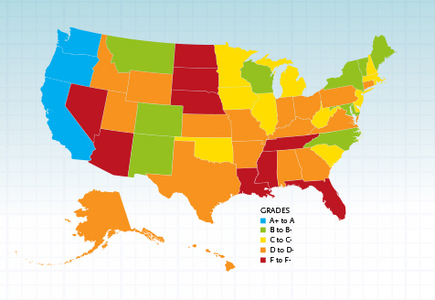The article you are about to read is neither an look at the morality of abortion nor a defense for women’s rights. It is a look at the history, future and constitutionality of abortion laws. I am neither pro-choice nor pro-life. I’m not republican or democrat. I am not a feminist. I don’t believe we should categorize and label ourselves over generalities because each choice we make has the potential to redefine who we are and who we think we are. That being said, it was extremely difficult to drudge through websites to find facts on this subject. The argument for/against abortion has been so politicized that every site has a slant. I did my best to leave politics behind and just look at the facts on this subject.
In the Beginning
When America was founded, abortions were legal. There were those for it and against it then as there are now, but it did not affect the laws. There were homes for unwed mothers and campaigns to “adopt not abort,” but the state did not have any laws on the books until the mid-to-late 1800’s.
The American Medical Association
The American Medical Association (AMA) was the catalyst for the first abortion laws, but for reasons you wouldn’t likely expect. Through criminalizing abortion, the AMA could push midwives, apothecaries, and homeopaths out of business by eliminating their principle procedure – abortions. Think about this, the AMA was against abortion for reasons related to business, position and profit and used the morality argument as the wedge.The AMA set the stage for what we see now. It introduced the pro-life side so it could corner the market on the abortion business. The AMA argued that abortion was immoral and dangerous and by 1910, every state had laws forbidding it unless it was to save a woman’s life, in which case a physician would perform it. No more midwives, apothecaries or homeopaths.
Did these laws protect women? No, back-alley abortions increased and more women died from complications. These back-alley abortions weren’t necessarily only unwed or unfit mothers either, women who had medical complications with the pregnancy but couldn’t afford to go to a physician could no longer seek out a midwife or other practitioner to conduct the procedure.
Margaret Sanger
In the 1900’s Margaret Sanger started educational campaigns for contraceptives because she opposed abortion. (For more information about Margaret Sanger, her involvement in founding Planned Parenthood, and her involvement in the Eugenics Movement in America read The History of Birth Control and Eugenics). As a proponent of the eugenics movement she had an agenda to keep, “More children from the fit, less from the unfit,” (Birth Control Review, May 1919, p. 12), but she did not pursue this agenda via abortions. As a nurse she cared for many women who died from complications of botched abortions and was very opposed to the practice because of the danger it imposed on women. Interestingly enough, Margaret Sanger founded the American Birth Control League, what we now know as Planned Parenthood. Today, Planned Parenthood performs legal abortions with government funds. Although it is ironic, I suspect that Sanger would likely approve of the procedure today because it is now a much safer procedure for women than it was during her time.
Roe v. Wade
Jumping ahead a bit to 1973, we come to the landmark case of Roe v. Wade. Texas, along with most other states had strict abortion laws that only allowed it if the women’s health was in danger. In this case, a 21-year-old woman brought a class action suit opposing the constitutionality of the law against abortion. She won. The Supreme Court ruled that the laws restricting women from having an abortion violated the Due Process Clause of the Fourteenth Amendment:
All persons born or naturalized in the United States, and subject to the jurisdiction thereof, are citizens of the United States and of the state wherein they reside. No state shall make or enforce any law which shall abridge the privileges or immunities of citizens of the United States; nor shall any state deprive any person of life, liberty, or property, without due process of law; nor deny to any person within its jurisdiction the equal protection of the laws.
Today, this case is still the basis for the approval or rejection, and appeal of state and federal laws.
Today
The controversy remains heated. In 2012, Arizona passed a law that made it illegal for women to have abortions after 20 weeks of pregnancy, but in May 2013, aU.S. Court of Appeals in San Francisco ruled that the measure violates controlling U.S. Supreme Court precedent under the court’s 1973 decision in Roe v. Wade. It was a unanimous ruling. However, prior to the Court of Appeals decision, federal judge James Teilborg ruled the law constitutional because it did not prohibit women from ending their pregnancy, just forced them to do it earlier in the pregnancy.
More recently, on July 18, 2013 Texas Govenor, Rick Perry signed a law making it illegal for a woman to have an abortion after 20 weeks of pregnancy. Texas joins 12 other states with similar laws.
While I’m a firm believer of State rights under the Tenth Amendment (which is why each state has different abortion laws). Legislation should not be based on what is considered right or wrong according to a politician’s beliefs; laws should be based on what is safe for the citizens the law is supposed to protect. Is an abortion after 20 weeks unsafe? That is a discussion we have not had. It’s certainly not common; according to the Guttmacher Institute, an abortion rights organization, it is estimated that only that 1.5 percent of abortions takes place after 21 weeks of pregnancy.
The Slippery Slope
In recent years, several states have passed “wrongful birth” laws. These laws prohibit medical malpractice lawsuits against doctors who withhold information from a woman that could cause her to have an abortion. Who are these laws protecting? The patient? The politicians’ re-election campaigns? The doctors? Take a minute to set your personal beliefs aside and think about this – there are laws that allow doctors to withhold medical information that could jeopardize the life of both the mother and fetus. How is that safe? How is that even remotely constitutional? How is it more morally acceptable to potentially allow both mother and child die in order to prevent an abortion? Yet, we the people have accepted it.
The Future
While most arguments about abortion never make it past debating morality and women’s rights, these laws and debates should dive into much deeper issues – state rights, separation of church and state, and the role of the government in our everyday lives. I can’t say whether or not abortion will be legal or illegal in five years or fifty, but one thing I know for sure is the absurdity of the bills introduced, laws passed, and what politicians say will continue to get out of control. Unless, we as citizen’s speak up.
I’m sure we all remember Representative Todd Akin’s statement in August 2012 on the subject of his opposition to abortion even in the case of rape, “If it’s a legitimate rape, the female body has ways to try to shut that whole thing down.”
More recently, in January 2013, a bill was introduced in New Mexico that would prevent abortion in the case of rape or incest because it would be considered “tampering with evidence in cases of criminal sexual penetration or incest.” This bill would make an abortion in the case of rape and incest a third degree felony potentially punishable by up to three years in prison!
I wish I was making this up, but as the saying goes, the truth is stranger than fiction. In my opinion, it’s all razzle dazzle to distract the public from the fact that we don’t need, nor should we have laws for or against abortion, but instead have regulations that monitor the safety of the procedure as it changes with technology. Maybe in the future voters will see the deeper issues in this debate and undo what the AMA set in motion in the pursuit of profit, power and prestige.































